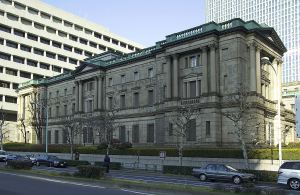Nikkei in Japan below 15,000: Abe, Kuroda and Longsighted Shirakawa
Takeshi Hasegawa, Kanako Itamae and Lee Jay Walker
Modern Tokyo Times
The Japanese Nikkei fell below 15,000 for the first time since October 2014 and like usual state intervention will likely witness more squandering of taxpayers money. By the fall of February 12, 2016, the Nikkei had fallen to 14,952.61. Therefore, with confusion over the weakness of the American economy worrying investors and China being blighted with negative economic results, then it appears that the Japanese government will implement more stimulus packages.
Recent economic changes based on a not too dis-familiar theory of relying on exporting out of a crisis based on a weakening yen appear to have come off the rails once more. In order to achieve this objective the government of Prime Minister Shinzo Abe implemented a monetary policy based on being ultra-aggressive. However, from the start this policy appeared shortsighted and unlikely to break the cycle of deflation.
In 2013 the Bank of Japan witnessed a changing of the guard from Masaki Shirakawa to Haruhiko Kuroda. Yet, the pessimism of Shirakawa towards the optimism of Abe and Kuroda appears to be more accurate. After all, from the outset of so-called Abenomics the former Bank of Japan governor stated in 2013 “A lack of cash isn’t what’s keeping companies from increasing capital expenditure.”
Shirakawa also said “If there was a single thing that would have cleared the fog and solved all problems, Japan wouldn’t have been in this situation for 15 years.”
Modern Tokyo Times in 2014 stated “Shirakawa stated openly that printing money aggressively by itself – or based on other major government intervention – would not solve the long spiral of deflation based on a revitalized Japan. However, Kuroda, sharing the economic mantle of Abe, believes in a Japanese style of shock therapy based on major state intervention. Ironically, for some this is deemed to be a capitalist approach but it shares much within the area of state socialism, irrespective of the political jargon being used.”
Of course, the ultra-rich gained from Abe’s policy that worked in unison with the Bank of Japan. In other words, the stock market gained enormously based on manipulating the economy but in real terms the “real economy” remains relatively the same. Of course, if the Japanese government once more intervenes in the economy, then some new rich pickings for the ultra-rich will emerge based on cheap stocks.
The Nikkei is down roughly 11 per cent this week. Therefore, with recent resignations within the ruling party then the Abe government is coming under pressure. On top of this, uncertainty about the strength of the economies of America and China remains. Similarly, the European Union is blighted by many negative factors in relation to political and social issues.
It therefore appears that the Japanese government will once more intervene in the currency markets if the stock market continues to slide and the yen continues to rise. Once more, for Japanese prime ministers this reality is nothing new because the same happened in 2011. Indeed, the last few decades have been based on exporting out of a crisis, manipulating the exchange rate, propping up the stock market and other issues related to a non-capitalist approach to economics.
The BBC reports: “Big exporters in Japan were hurt on Friday as the dollar fell to a 15-month low against the yen. A stronger yen against the dollar hurts Japan’s exporters, as it makes their products more expensive to purchase overseas.”
Internationally the day ended negatively because major indexes in America and Europe fell sharply. This is based on ongoing concerns about the price of oil, mixed news about the American economy and major geopolitical concerns.
Overall, it appears that Shirakawa was more in tune with reality in 2013 than either Abe or Kuroda. At the same time, it isn’t fair that Japanese taxpayers keep on witnessing futile measures that appear to be benefiting the most wealthy in society – and this applies to major private investors, the banking sector and powerful corporations.
http://www.bbc.com/news/business-35557072
Modern Tokyo News is part of the Modern Tokyo Times group
DONATIONS to SUPPORT MODERN TOKYO TIMES – please pay PayPal and DONATE to sawakoart@gmail.com
http://moderntokyotimes.com Modern Tokyo Times – International News and Japan News
http://sawandjay.com Modern Tokyo Times – Fashion
https://moderntokyonews.com Modern Tokyo News – Tokyo News and International News
http://global-security-news.com Global Security News – Geopolitics and Terrorism
PLEASE JOIN ON TWITTER
https://twitter.com/MTT_News Modern Tokyo Times
PLEASE JOIN ON FACEBOOK

